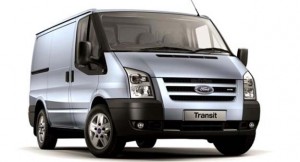Ford Motor Co. says it expected to boost the fuel economy of its large work vans by 25% when it migrates to an all-new design next year. A key reason for what is a spectacular increase in a traditional staid segment is Ford’s decision to go with several alternative powertrain packages.
The European-designed Transit van will be offered with both a turbocharged EcoBoost powertrain, Ford officials say, but will also be available with a new high-mileage diesel option. That, plus other efficiencies designed into the all-new Ford Transit should yield an average mpg number about a quarter higher than the old Econoline model, also known as the E-Series.
The Transit is the latest step in the maker’s migration to its so-called One Ford strategy. The goal is to hold down costs – and deliver more content to consumers – by sharing product designs on a global basis. In the past, the E-Series was offered in North America and a few other select markets, while Europe and most of the rest of the world shared the previous version of the Transit.
The payoff, Ford contends, will not only be a more modern, safer and better-equipped van, but one that can meet one of the most pressing needs of owners at a time when fuel prices are again soaring towards record levels.
“With fleet operators facing skyrocketing fuel prices and constant pressure to reduce costs, Ford continues to expand its range,” said Kevin Koswick, director, North American fleet, lease and remarketing operations for Ford. “By offering multiple options to help solve these challenges, Ford is giving fleet customers true power of choice in finding solutions that best meet their specific needs,” he added during a speech to the Detroit Automotive Press Association.
Ford’s decision to migrate to a global platform also reflects the fact that the large commercial van segment is rapidly becoming more competitive. Ford all but owned the niche for many years, but it has been facing tough competition, more recently, from Daimler AG’s Sprinter van. Nissan recently launched its own commercial line and, among others, Chrysler is now talking about coming up with an entry into the segment.
At the same time, acknowledged Koswick, demand has been depressed by the weak U.S. economy, though as it recovers it could lead to a significant burst of sales due to pent-up demand among fleet buyers who postponed purchases over the last several years.
Ford isn’t yet revealing the details of the diesel it has planned for the new Transit – which shouldn’t be confused with the smaller TransitConnect van. But the push to diesel has been increasing throughout the U.S. automotive market due to the significant increase in fuel efficiency that technology offers.
Meanwhile, Koswick noted that Ford is seeing more interest in two other alternative fuels, notably compressed natural gas, or CNG, and liquid petroleum gas, or LPG. The maker says it is now offering a mix of engines that are specially modified to handle the additional stresses of those fuels – which should also deal with another key fleet demand: high reliability.

